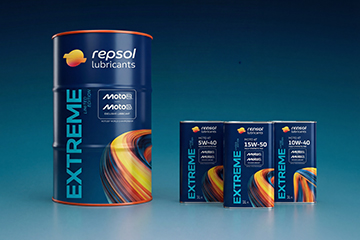Thermal oils: what they are, how they work, and how to choose the right one for your installation

In many industrial processes, heat is as essential as electricity or water. Sectors such as food, plastic, drying materials, or solar energy need to transport heat in a safe, efficient, and controlled way. To do so, thermal oils—also called thermal transfer fluids—are a reliable and versatile solution.
What is a thermal oil and why is it so important?
A thermal oil is a fluid formulated to absorb heat from one source (such as a furnace, electrical resistors, or a solar field) and transfer it to another point in the system, typically through a heat exchanger. Unlike direct heating, this method has key advantages:
- Uniform heat distribution, avoiding hot spots that may damage the product or equipment.
- Greater safety as the heat source is kept away from the point of application.
- Precise temperature control, improving final product quality and energy efficiency.
In a typical circuit, the oil is heated, circulates through pipes to the point of use, transfers its energy, and returns to the heater to repeat the cycle. All this occurs in a closed and pressurized system, which minimizes contact with oxygen and extends the fluid’s useful life.
General characteristics of thermal oils
The efficiency and durability of a thermal oil depend directly on its physicochemical properties. A good heat transfer fluid must meet a series of technical requirements that guarantee optimal and safe performance throughout its useful life:
- High heat capacity and good thermal conductivity.
- Low viscosity, which facilitates the flow of oil, improves heat exchange, and reduces energy consumption.
- Good performance at low temperatures, for cold starts.
- Thermal stability, to prevent degradation at high temperatures.
- Chemical compatibility, no unwanted reactions with other fluids.
- Non-corrosive, to protect system components.
- Low danger in case of degradation, taking care of the safety of the plant and the environment.
Causes of degradation of a thermal oil
Over time, even the best oils end up losing some of their properties. The most common causes are:
- Excessive temperatures, leading to thermal cracking.
- Oxidation: the entry of oxygen or water into the circuit generates sludge, acids, and corrosion.
- Contamination: the presence of other fluids or particles alters the properties of the oil and accelerates its deterioration.
That’s why choosing a quality oil and proper maintenance is essential to prolong its useful life.
Repsol Maker Heat Transfer range: solutions for every need
At Repsol Lubricants, we know that there is no single thermal oil that works for everything. Each installation has its special features: working temperature, type of circuit, environmental conditions, frequency of operation, and so on. That is why we have developed the Maker Heat Transfer range, which covers everything from simple applications to highly demanding industrial processes.
Maker Heliotermo: the solution for moderate applications
The Maker Heliotermo is a mineral thermal oil for moderate applications (up to 250°C), making it ideal for systems such as electric radiators and oil heating equipment, where a reliable, stable fluid with good oxidation resistance is sought. Its formulation ensures a uniform and safe heat transfer, avoiding the buildup of deposits.
Maker Térmico: robust performance in industrial environments
When the installation requires working at higher temperatures, the Maker Térmico is the right choice. Also mineral-based, but with superior refining and specific additives, this oil is designed for closed circuits with forced circulation, reaching up to 300°C average operating temperature and peaks of 315°C in the oil film. It is a solution widely used in continuous industrial processes, where thermal stability and resistance to degradation are critical.
Maker Térmico Synth: maximum stability and performance under extreme conditions
For environments where temperatures are extreme, the Maker Térmico Synth offers unique advantages. Formulated with synthetic bases, it withstands up to 315° C in average temperature and 330° C in film, with an extremely low freezing point (-66° C), making it perfect for installations in cold climates or processes that require low temperature starts.
Choosing well saves and protects your facility
The choice between a mineral or synthetic thermal oil is something that depends on the working conditions. That’s why if your system operates at moderate temperatures and in controlled environments, a quality mineral oil such as Maker Heliotermo or Maker Térmico can offer excellent performance and be cost effective. Meanwhile, if you work in extreme conditions, with very high temperatures or cold climates, a synthetic oil such as Maker Térmico Synth provides greater stability, better fluidity, and a longer useful life.
That’s why choosing the right product can make the difference between an efficient and safe process, or one with shutdowns, extra costs, and unnecessary risks. If you need help find out which is the ideal thermal oil for your installation, remember that you can contact our team of experts via this link.
Related content




